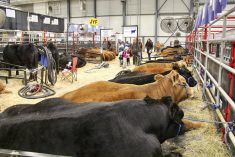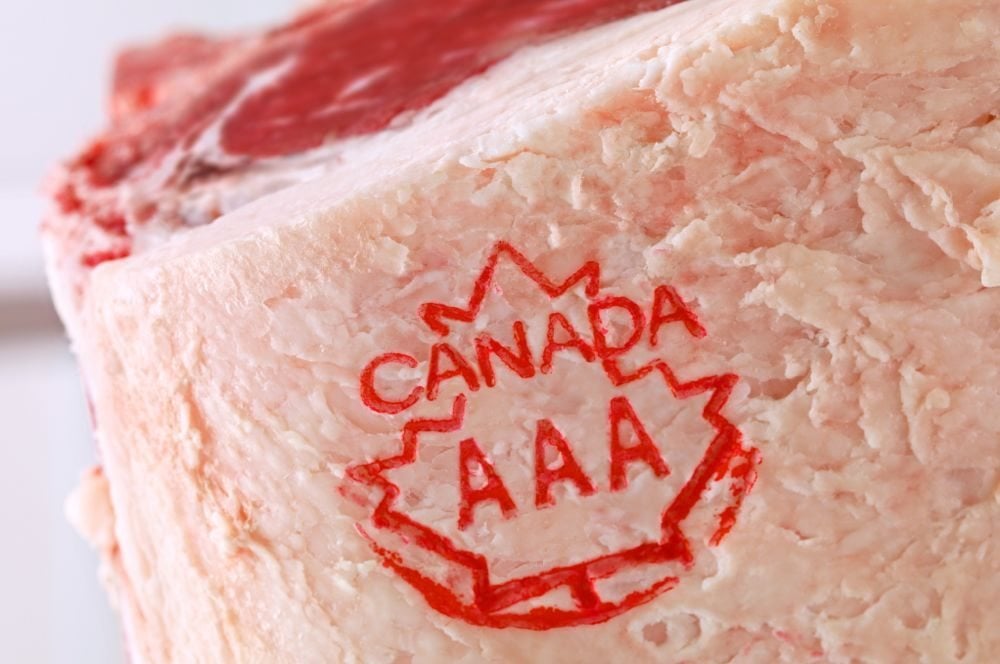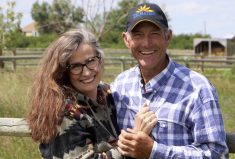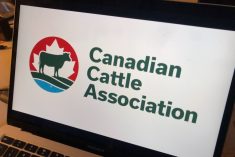When Bob Lowe was elected president of the Canadian Cattlemen’s Association (CCA) in March 2020, he couldn’t have anticipated everything the year ahead had in store.
Mere days after CCA’s annual general meeting, Canada was in lockdown due to the pandemic, changing the trajectory of everyone’s year and presenting numerous challenges to the Canadian food industry.

“I don’t think anybody could have predicted what it was going to bring,” says Lowe, reflecting on 2020, a year that saw CCA holding online town halls and weekly press conferences to update beef producers on how the association was working to remedy major supply chain disruptions.
It certainly wasn’t how Lowe expected his first year in the role to play out. “I came into the position with the idea of trying to increase consumer awareness and confidence in their beef supply — just trying to increase the awareness of food in general,” says Lowe, who is the managing partner of Bear Trap Feeders at Nanton, Alta. “One of our major problems is people take food for granted.”
People were made painfully aware of that problem in the early days of the pandemic, when the possibility of empty grocery store shelves became a reality. The silver lining to this, however, was a huge rise in interest in the Canadian food system, bringing about a new level of understanding for many.
Read Also

Growing Canada’s beef herd: CCA’s priorities working with new federal government
This is my first column since the federal election. The Canadian Cattle Association works with all elected officials and parliamentarians, regardless…
“It sure would have been nice to do it a different way, but it did alert the general public to food,” he says.
While the pandemic didn’t alter Lowe’s long-term goals as CCA president, it added to them while shifting his short-term priorities. “Our number-one concern was keep the industry moving, keep producing beef and keep processing it and keep feeding people.”
As outbreaks at major packing plants significantly decreased Canada’s beef processing capacity last spring, doing so was no small feat. To address processing backlogs and resulting beef shortages at retailers, Lowe and the CCA staff and board worked with other industry organizations to request federal support for a set-aside framework, similar to that used during the BSE crisis.
This and other collaborative efforts shone a light on the segmented nature of Canadian agriculture. “We realized at some point in time, way back last spring, we’re all producing one thing, and that’s food, and we’d better start talking the same language,” says Lowe. “It really pulled all the industry groups together.”
CCA and other commodity groups, including the Canadian Pork Council and the Canadian Grain Council, partnered with the Canadian Federation of Agriculture on an advertising campaign promoting Canadian food production as a whole, targeting urban audiences. This co-operation is something Lowe hopes to see more of going forward, and the key, he notes, is to set aside differences between commodities and focus on common concerns and interests.
The pandemic highlighted more than just the need for the agri-food industry to speak with one voice. “It brought to light definitely the weaknesses in the supply chain. It brought to light the importance of the frontline people: the people in the grocery stores, the people in processing plants that no matter what had to go to work,” he says.
“I think sometimes we forget about them,” he continues, referring to workers at beef packing plants. “You kind of take for granted what happens there. Well, this made us acutely aware that we can’t take that for granted.”
This also highlighted how having the majority of the country’s beef processing capacity in just a couple of facilities can be detrimental if those plants have to temporarily shut down. While the industry needs the big facilities, Lowe states, more small abattoirs are required, as well as contingency planning to allow for credible provincially inspected plants to more easily receive federal approval in times of emergency.
For Lowe, the biggest challenge personally throughout this situation was to stick to the high road and not become frustrated by these trials. Maintaining CCA’s focus on thinking ahead was a necessity.
“If we do this today, what happens tomorrow?” That was a huge challenge given that they were facing issues daily, he says, and didn’t know all the issues the pandemic would throw their way.
The uncertainty made planning nearly impossible. “In BSE we had one focus: get the borders open,” he recalls. “The pandemic was a totally different scenario because nobody knew what was out there.”
However, he’s grateful that the Canada-U.S. border remained open to essential services, which include food. “It did prove how trade, both within Canada and within the rest of the world, leads to food security, and without that trade we really lack food security big time.”
Onwards and upwards
In reflecting on the challenges of 2020, Lowe is most proud of the fact that the Canadian beef industry is still here, moving ahead and feeding Canada and the world. “Cows have to be fed, they have to be processed, food has to end up on the shelves,” he says.
“We did keep moving, we kept generating dollars, and I’m hoping that that shows everybody and the government that no matter what happens we’re here, and with a little bit of strategic help from government, which we did get some, we can be a major force in getting the economy back when this is all over.”
While he believes we’re all still learning from this experience, his greatest lessons have been the importance of staying the course and continuing to talk to the public, other agriculture organizations and the government. “The biggest lesson to me is don’t focus on the disease, focus on the future.”
The industry as a whole learned much in 2020 about weaknesses in the supply chain, the people vital to the system and the importance of trade to food security. Lowe believes that if we are to make the most of these lessons to build something stronger, we have to begin by ensuring all food processors on the frontlines continue to be considered essential services and are no longer taken for granted.
“We have to make sure that they know how important they are to our system and that we know how important they are to that system. Without them, we’ve got nothing,” he says. “I think that’s one of the major lessons, and we’ve got to have everybody appreciate that fact.”
He also hopes the industry continues to focus on the importance of trade and maintaining as many markets as possible to help guarantee food security. For example, he points to the case of McDonald’s Canada announcing last spring that they were temporarily unable to source 100 per cent Canadian beef. The restaurant was able to return to all-Canadian sourcing by September.
“They had to source for a temporary supply of hamburger from outside of Canada. But the big thing there? They didn’t run out of hamburger. That’s where trade comes in, where we have to keep these borders open. We have to keep fair trade amongst us all.”
In terms of his priorities for 2021, Lowe is looking forward to CCA’s board of directors being able to meet in person once it’s finally possible. “When 10 per cent of communication is words, 20 per cent is listening and 70 per cent is body language, even on Zoom you miss the body language,” he says.
“We need to be able to get together, and I think that’s society as a whole. To do this policy, to do this strategy stuff, we need to be able to sit down at the table, and the sooner we can get that done and get caught up, the better off we’re all going to be.”
Lowe, who has been instrumental in initiatives such as the Canadian Roundtable for Sustainable Beef, has a forward-looking perspective on his own operation and the opportunities for those raising and finishing cattle. “I still believe we’re in a protein-deficient world, and if you’re producing protein, that’s going to be a good thing.”
By the time he hands over the CCA reins in March 2022, Lowe is hopeful the Canadian beef industry and society as a whole will be functioning in a more normal manner.
“I really think we’ve got a huge opportunity to build the industry, and there’s a variety of different ways we’re working on it,” he says. “As short a term as next year, I hope that social distancing and masks and Zoom meetings are a thing of the past.”

















